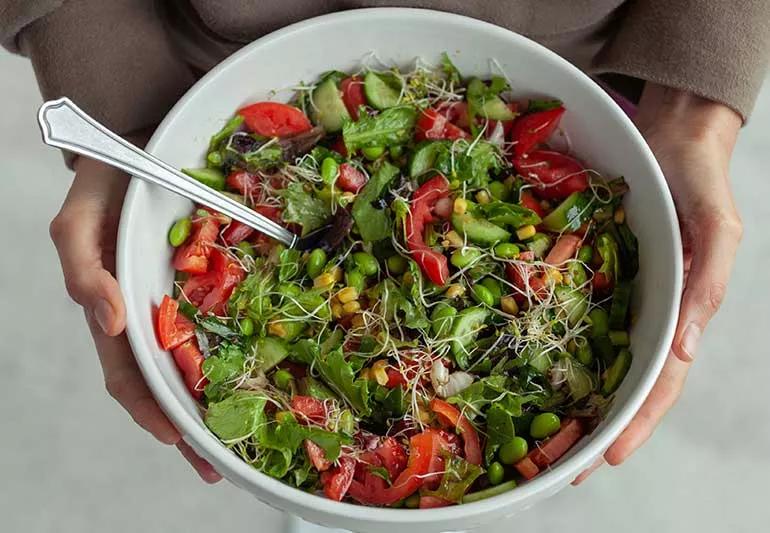Consider one of these plans to improve your health and eating habits

Image content: This image is available to view online.
View image online (https://assets.clevelandclinic.org/transform/9bcb5cdc-90c1-48d4-bd25-72855ae20ef4/12-Diets-For-You-1222098711-770x533-1_jpg)
Person holding a salad in a bowl.
No matter your reason for starting a diet — whether it’s to lose weight, establish better eating habits or part of a healthier lifestyle — we know you’re probably thinking, Which diet is right for me?
Advertisement
Cleveland Clinic is a non-profit academic medical center. Advertising on our site helps support our mission. We do not endorse non-Cleveland Clinic products or services. Policy
New trendy diets pop up on our radars all the time — we’re looking at you fruitarian diet, 100 diet, grapefruit diet, carnivore diet and raw foods diet. But there are some tried-and-true options that can help you reach your wellness goals.
We’ve put together a list of recommended diets, as well as some strategies that aren’t necessarily “diets” but involve changing your relationship with food.
The Mediterranean diet continues to be the gold standard for eating healthy because it does just that — by eating a diet full of fruits, vegetables, whole grains, fish, lean meats and olive oil, you can reap all the heart-healthy benefits, says dietitian Julia Zumpano, RD, LD.
Like the Mediterranean diet, the Nordic diet focuses on whole foods found in the Nordic region but touts using canola oil instead of extra-virgin olive oil, explains registered dietitian Courtney Barth, RD.
The Volumetric diet is all about filling up on as many low-calorie, healthy foods as you want, says Zumpano. The results? You don’t feel as hungry as you may on other diets.
If you’ve been toying with the idea of going vegan or vegetarian, there are some options that let you dip your toe into those ways of eating.
Advertisement
According to registered dietitian nutritionist Rosemarie Lembo James, RD, CNSC, LDN, for those who don’t want to go full vegan, the pegan diet combines the philosophies of both a vegan diet and the paleo diet with the goals of lowering blood sugar and inflammation in your body.
And if you’re not ready to go full vegetarian, the flexitarian diet lets you enjoy meat occasionally but puts the spotlight on enjoying fruits, veggies, whole grains, legumes and nuts, says registered dietitian Kate Patton, MEd, RD, CSSD, LD.
You may have heard your friends singing the praises of the keto diet. According to registered dietitian Sharon Jaeger, RD, LD, by eating a limited amount of carbs and upping your fat intake, the idea is that your body enters ketosis and uses fat for fuel. It’s not for everyone, but if you have Type 2 diabetes or obesity, it can be helpful.
Another diet that focuses on cutting carbs is the Atkins diet, but this plan includes different phases that dictate how many carbs you have, says registered dietitian Maxine Smith, RD, LD.
If you have hypertension, Patton adds that the DASH diet encourages you to cut back on the amount of sodium you consume, which can help lower your blood pressure.
The name says it all, but the Whole 30 diet is about eating specific whole foods for 30 days, explains Jaeger. There aren’t any calorie restrictions but you have to eliminate certain foods (think dairy, beans, alcohol and sugar) for 30 days to “reset” your body before slowly reintroducing those foods.
If you’re looking to change your relationship with food, psychologist Susan Albers, PsyD, says intuitive eating might be for you. It’s a focus on trusting your body and looking for satiety cues that can help you decide what to eat and how much. And the best part? No food is off the table.
For those of us who mindlessly eat while bingeing Netflix (raises hand), consider mindful eating. This philosophy focuses on why and how we eat, with the goal of slowing down and enjoying what we’re eating, says Smith.
Intermittent fasting can be helpful for those who are looking to reduce their calorie intake. The idea is that you cycle between fasting and eating, explains registered dietitian Anna Taylor, RD, LD. There are different methods, like eating for eight hours and then fasting for 16 hours.
Before you start a diet, it’s best to discuss it with a healthcare provider. But no matter which diet you pick, a focus on healthy eating is one of the best things you can do for your overall health.
Advertisement

Sign up for our Health Essentials emails for expert guidance on nutrition, fitness, sleep, skin care and more.
Learn more about our editorial process.
Advertisement
Alternating between periods of eating and fasting may benefit your health
This plant-based eating plan focuses on lowering cholesterol, making it a great companion to the Mediterranean diet
Choose foods that are low in fiber and easy to chew and swallow
The flexible eating plan aims to boost your brain health by focusing on plant-based foods and limiting saturated fat
Designed to lower your blood pressure, this eating plan focuses on heart-healthy foods like whole grains, fruits and vegetables
Pescatarians don’t eat poultry, game or red meat, but they do eat fish and seafood, dairy and eggs
This eating style has many health benefits, including weight loss, an improved microbiome, and increased nutrient and mineral consumption
Research shows promising results from options like the DASH diet and Mediterranean diet
Prioritize your health by managing stress, strengthening your social connections and getting quality sleep
Bolsters, blankets, pillows and blocks can offer extra support, stability and comfort
Allergies, postnasal drip, asthma or reflux could be to blame for a cough that won’t quit